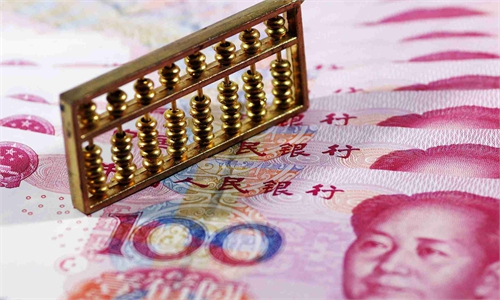Shanghai index dips below 3,000 points amid epidemic flare-up, but investor optimism remains

stock market Photo:VCG
The Shanghai Composite Stock Index fell below the key support level of 3,000 points on Monday, as Chinese shares took a beating as investors sold off amid rising anxieties over coronavirus flare-ups in some of the nation's largest cities.
The downward trend over the short run is expected to give way to sustained optimism on the country's capacity to strike a balance between its dynamic zero-COVID policy and economic growth, market analysts say, hoping for ramped-up pro-growth measures from the government to cheer up investors in the longer term.
The benchmark Shanghai index dropped 5.13 percent to close at 2,928.51 points on Monday, while the tech-heavy ChiNext index plunged 5.56 percent to finish below 2,200 points. Up to 300 stocks plunged by their daily limits, while over 3,000 stocks fell by more than 7 percent.
Hong Kong's Hang Seng Index slid 3.73 percent to below 20,000 points.
The 3,000-point matters significantly among investors, as a raft of favorable policies has been announced recently, underpinning the market and uplifting investor confidence.
Still, the market is approaching a "second bottom" after having rebounded from an earlier bottom, as internal and external uncertainty have yet to dissipate, according to Yang Delong, chief economist at Shenzhen-based First Seafront Fund Management Co.
The spiral downward across the stock, bond, and yuan's value since last week can be attributed to multiple factors, Wu Jinduo, head of fixed income at the research institute of Great Wall Securities, told the Global Times on Monday.
The triple pressures on China's economic development -- shrinking demand, supply shocks and weakening expectations -- are fermenting amid recent woes, Wu said.
She cited virus flare-ups since March that have hit cities including Shenzhen, Guangzhou, Shanghai and most recently Beijing.
The economy grew 4.8 percent year-on-year in the first quarter. But investors are spooked by the persisting epidemic situation in Shanghai since late March.
In addition, the US Federal Reserve's monetary policy tightening has resulted in a substantial spike in the 10-year Treasury yield to nearly 3 percent. The inversion of a key yield gap between 10-year US Treasury notes and the Chinese equivalent has added to concerns over capital outflows.
The US monetary policy tightening has prompted the US Dollar Index to rise above 100, piling pressure on the yuan to rapidly depreciate, Wu remarked.
The yuan has continued its weakness since last week, with the offshore yuan weakening beyond 6.6 versus the US dollar intraday on Monday, its lowest level since November 2020. The onshore yuan also skidded past 6.56 per dollar on Monday, with its daily losses topping 500 basis points (bps). The yuan has depreciated over 2,000 bps against the dollar over the past five trading days.
In an effort to rein in the yuan's depreciation, China's central bank on Monday decided to cut banks' foreign exchange reserve requirements by 1 percentage points to 8 percent, effective May 15.
Nonetheless, the size and duration of short-term capital outflows shouldn't be exaggerated, Wu said.
Daily net sales via the northbound leg of the stock linkups between the Hong Kong and Chinese mainland bourses hit 4.4 billion yuan ($669.11 million) on Monday, reversing daily net purchases of 6.77 billion yuan on Friday and net inflows of 911 million yuan on Thursday.
Shanghai's new COVID-19 cases have shown signs of decline. As the city awaits the day of zero COVID-19 cases for its entirety, market expectations would certainly see a turnaround, she estimated, taking confidence from China's taking the lead in implementing a zero-COVID policy globally.
At a regular briefing on Monday, Foreign Ministry spokesperson Wang Wenbin said that China's zero-COVID policy and anti-virus rules are based on science and expert opinions, in accordance with China's actualities and the World Health Organization's guiding principles, making significant contribution to the global response to the pandemic.
Containment measures adopted in some Chinese cities have a certain impact on production and life, which is likely to happen in any country, Wang said, noting that the vast majority of Chinese people understand and support the government's virus-fighting policies and measures.
"Chinese people are full of confidence about beating the epidemic," the spokesperson said.
China won't lay idle in the face of the Omicron variant and will instead steadfastly advance the battle against Omicron, he remarked. "We're destined to win and will make a greater contribution to the world."
As local governments across China move to step up new project starts, the formation of fixed-asset investment is estimated to accelerate, stabilizing economic growth, Yang said.
Moreover, the government is set to roll out more measures to prop up the economy and stimulate consumption. Such moves would to a certain degree hedge against the virus' fallout, he said.
Once the epidemic is effectively put under control, transient measures in place to fight the virus would be gradually rolled back, the economist said, predicting a resultant upward spiral in the stock market.
In a fresh move, the State Council, the cabinet, on Monday unveiled guidelines to further unleash the potential of consumption and foster a continued recovery in consumption.
The Fed's monetary tightening would have a notable fallout on capital outflows, Wu said, expecting the pace of US Fed's rate hikes and balance sheet reductions to possibly slow in the second half of the year.


